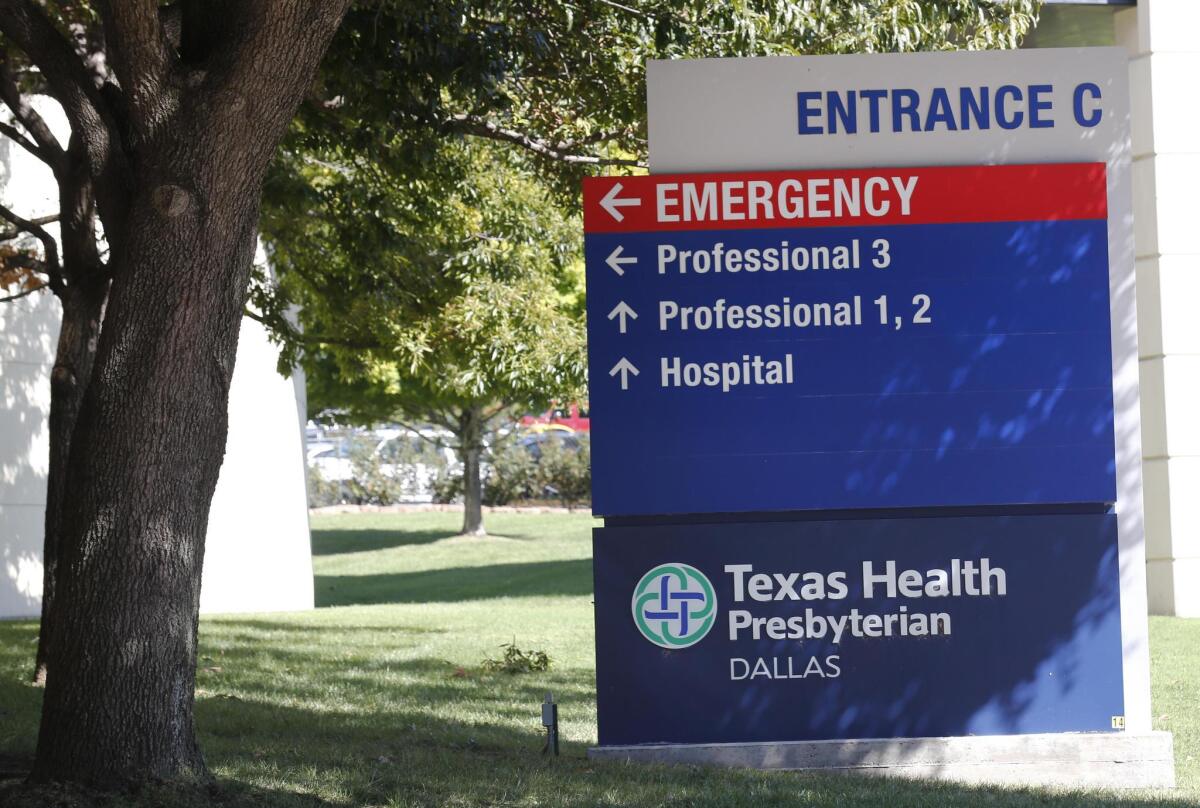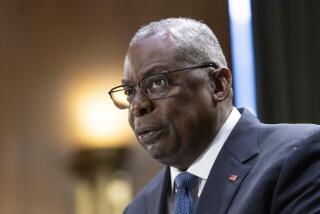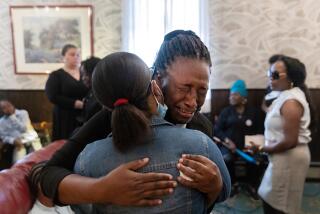New Jersey Ebola scare over; man does not have disease

- Share via
Reporting from Dallas — The passenger who became ill on an international flight that landed in New Jersey on Saturday is not suffering from the deadly Ebola virus, ending an hours-long scare that saw quarantine officers descend on a major airport while health officials in Dallas continue to monitor dozens of people who came in contact with an Ebola patient there.
The ailing passenger, identified only as a 35-year-old man, began vomiting on a United Airlines flight that had flown from Brussels and landed at Newark Liberty International Airport around 12:15 p.m., a law enforcement official told the Los Angeles Times.
The man and his daughter were rushed to University Hospital in Newark, while investigators with the Centers for Disease Control and Prevention held passengers on the plane for nearly 90 minutes.
University Hospital spokeswoman Tiffany Smith said the man was actually suffering from a “minor, treatable condition unrelated to Ebola.” The man and his daughter were released from the hospital Saturday evening.
The scare in New Jersey came hours after U.S. public health officials said it will take more than a month before they can declare the risk of Ebola exposure eliminated in Dallas, where a patient from Liberia became the first person to be diagnosed with the disease in the U.S. earlier this week.
The condition of Thomas Eric Duncan, who was taken to Texas Health Presbyterian Hospital and placed in isolation on Sept. 28, worsened from serious to critical on Saturday, hospital officials said.
Public health officials said they have screened 114 people and were monitoring about who may have been exposed to Duncan after he arrived in Dallas on Sept. 20. The monitoring includes taking temperatures and watching for signs of fever or other Ebola symptoms.
The group includes nine people considered at high risk of exposure, including healthcare workers and relatives of Duncan, Frieden said at Saturday’s briefing.
Frieden said it was important to follow up with Duncan’s potential contacts during the “peak period” of about a week after exposure. As of Friday, officials had been able to reach all but one of the 50, including all nine considered high-risk, Frieden said.
The four people Duncan was staying with in Dallas have been confined to a home. They include his girlfriend Louise Troh, her 13-year-old son, and two young men: one a relative, another a friend.
“The way to stop Ebola in its tracks is contact tracing and follow-up,” Frieden said.
The CDC has had 100 consultations with state and local health departments and healthcare providers regarding possible Ebola cases, Frieden said. Only 15 warranted testing. Frieden said his team alerted him in advance about Duncan’s case because of “the severity of his symptoms,” and said none of the others had risen to that level yet, saying “the risk was far, far lower.”
He said calls from some members of the public to stop commercial airline flights from West Africa and “seal ourselves off from the world” would not prevent cases like that of Duncan, who apparently did not have symptoms until days after he arrived.
In fact, he said, it could backfire: When Senegal recently halted flights to Liberia, he said, the move delayed the arrival of healthcare responders from the African Union.
He said exit screening of passengers at airports in West African countries has stopped 77 people from boarding departing flights, including 17 in September, though there was no follow-up monitoring to determine whether those individuals were later diagnosed with Ebola.
The man who fell ill in New Jersey had traveled to West Africa recently, according to Jason McDonald, a CDC spokesman. It was not clear how long ago he had visited the region, or which countries. The flight was carrying 253 passengers and 14 crew members, all of whom were cleared to depart the plane after a 90-minute screening by CDC officials.
McDonald also noted that there had been several false alarms concerning Ebola, including an ill passenger aboard a recent flight at John F. Kennedy International Airport in New York. The incident turned out to be a child suffering a seizure unrelated to the virus.
Although the CDC is evaluating how West African arrivals are screened in the U.S., Frieden said, “nothing that we would have done in Liberia or the U.S. would have changed the course of the current situation.”
One thing that can be learned from Duncan’s case, he said, is that healthcare workers need to document a patient’s travel history.
“Hospitals across the nation have to learn from this experience. The travel history is very important to take right now,” said Dr. David Lakey, commissioner of the Texas Department of State Health Services.
Lakey made a plea to healthcare workers: “If you have a patient with fever or symptoms possibly related to Ebola, you have to ask that travel history.”
Officials at Texas Presbyterian Hospital conceded late Friday that doctors handling Duncan’s case initially turned him away from the hospital despite having been informed that he had recently arrived from Africa.
Earlier this week, hospital officials said that emergency room doctors who first treated Duncan were not aware that had traveled from Africa, even though a nurse who questioned him had documented that fact.
They said the miscommunication was due to a flaw in the electronic medical record system.
“We would like to clarify a point made in the statement released earlier in the week. As a standard part of the nursing process, the patient’s travel history was documented and available to the full care team in the electronic health record, including within the physician’s workflow,” the new hospital statement said.
“There was no flaw in the EHR in the way the physician and nursing portions interacted related to this event,” it said.
Duncan arrived in Dallas from Liberia on Sept. 20. He first visited the hospital’s emergency room on Sept. 25 with a temperature of 100.1 degrees, abdominal pain, a headache and trouble urinating, according to a statement released by the hospital late Thursday.
A nurse asked Duncan whether he had traveled during the last four weeks, and he said he had been in Africa, according to the hospital statement.
The nurse recorded that information in Duncan’s electronic medical record. But the hospital initially said doctors who treated him used a separate record that did not include the travel history. The earlier statement, now revised, said doctors and nurses use separate “workflows.”
The man was sent home with a prescription for antibiotics, relatives said, but he got worse.
Duncan came to the U.S. to visit Troh, who lives with her son at the Ivy Apartments. The two men now being confined with Troh and her son were also staying at the apartment. Other relatives visited, including several children who attend four local public schools.
On Sept. 28, Duncan returned to the hospital by ambulance, was placed in isolation and two days later tested positive for Ebola.
Hospital officials initially said they released Duncan’s medical information “in the interest of transparency, and because we want other U.S. hospitals and providers to learn from our experience.”
They also said they had changed the electronic medical record format in response to Duncan’s case and “relocated the travel history documentation to a portion of the [medical record] that is part of both workflows. It also has been modified to specifically reference Ebola-endemic regions in Africa,” according to the statement.
“We have made this change to increase the visibility and documentation of the travel question in order to alert all providers. We feel that this change will improve the early identification of patients who may be at risk for communicable diseases, including Ebola,” it said.
A CDC team dispatched to Dallas has been tracking Duncan’s contacts in both the community and the hospital.
More to Read
Sign up for Essential California
The most important California stories and recommendations in your inbox every morning.
You may occasionally receive promotional content from the Los Angeles Times.















